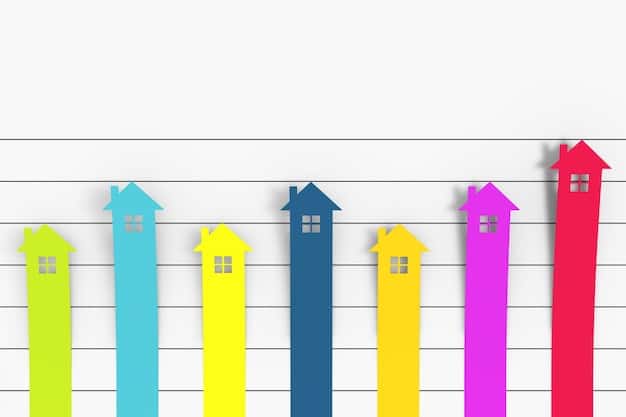Mortgage Rates at 7%: Expert Advice for Home Buyers & Refinancing

Mortgage rates have surged to 7%, prompting concern among homebuyers and those looking to refinance; experts advise careful financial planning, exploring various loan options, and improving credit scores to navigate the current market.
Navigating the housing market can feel like traversing a minefield, especially when mortgage rates hit 7%: Expert Advice for Homebuyers and Refinancers becomes essential knowledge. Let’s break down what this means for you and how to approach it.
Understanding the Impact of 7% Mortgage Rates
The recent increase in mortgage rates to 7% has sent ripples through the real estate market, affecting both potential homebuyers and those looking to refinance their existing mortgages. This change represents a significant shift from the historically low rates seen in recent years, leading to increased borrowing costs and a recalibration of affordability.
How Rising Rates Affect Homebuyers
For those looking to purchase a home, higher mortgage rates translate directly into higher monthly payments. This can reduce the amount of house one can afford, potentially forcing buyers to lower their sights or delay their purchase.
The Refinance Dilemma
Homeowners who might have considered refinancing to take advantage of lower rates in the past are now faced with a different scenario. With rates at 7%, refinancing may no longer be an attractive option unless there are other compelling reasons, such as consolidating debt or shortening the loan term.
- Higher Monthly Payments: Increased rates mean larger monthly mortgage payments.
- Reduced Affordability: Buyers may need to adjust their budgets or consider less expensive homes.
- Slower Market Activity: Rising rates can cool down the housing market as demand decreases.

In conclusion, understanding the impact of these higher rates is crucial for anyone involved in the housing market. Whether you’re buying or refinancing, being aware of the financial implications will help you make informed decisions.
Expert Advice for First-Time Homebuyers
Entering the housing market as a first-time homebuyer can be daunting, especially with the current mortgage rate environment. However, with the right approach and expert guidance, it’s still possible to achieve your dream of homeownership.
Budgeting and Financial Planning
Start by creating a realistic budget that accounts for all potential homeownership costs, including the mortgage payment (principal and interest), property taxes, homeowner’s insurance, and potential maintenance expenses.
Improving Credit Scores
A higher credit score can significantly impact the interest rate you receive on your mortgage. Take steps to improve your credit score by paying bills on time, reducing debt, and checking your credit report for any errors.
- Get Pre-Approved: Know how much you can borrow.
- Explore First-Time Homebuyer Programs: Research government and local programs.
- Shop Around for Rates: Compare offers from multiple lenders.
Careful planning and a proactive approach can help first-time homebuyers navigate the challenges posed by higher mortgage rates. By focusing on financial readiness, exploring available resources, and seeking expert advice, you can increase your chances of successfully entering the housing market.
Strategies for Current Homeowners
For current homeowners, the rise in mortgage rates presents a different set of considerations. Whether you’re looking to refinance, renovate, or simply manage your existing mortgage, there are strategies you can employ to navigate the current landscape.
Assessing Refinance Options
While refinancing may not be as appealing with rates at 7%, it’s still worth assessing your options. Consider factors such as your current interest rate, loan term, and financial goals to determine if refinancing makes sense for you.
Investing in Home Improvements
Instead of refinancing, consider investing in home improvements that can increase the value of your property. This can be a smart way to enhance your home’s appeal and potentially increase your equity.
- Consider an ARM: Adjustable-rate mortgages may offer lower initial rates.
- Debt Consolidation: Refinance to consolidate high-interest debt.
- Review Your Budget: Adjust your budget to account for higher rates.

In summary, current homeowners can take proactive steps to manage their mortgages and make informed financial decisions in response to rising rates. By assessing refinance options, considering home improvements, and carefully managing their budgets, homeowners can navigate the current market with confidence.
The Role of Adjustable-Rate Mortgages (ARMs)
Adjustable-Rate Mortgages (ARMs) can be an alternative for borrowers willing to accept some interest rate risk. An ARM typically offers a lower initial interest rate compared to a fixed-rate mortgage, but the rate can change over time based on market conditions.
Understanding ARM Features
ARMs come with various features that borrowers should understand, including the initial interest rate, the adjustment period, the margin, and any rate caps.
Risks and Benefits of ARMs
While ARMs can offer lower initial payments, they also expose borrowers to the risk of rising interest rates in the future. Borrowers should carefully weigh the potential benefits against the risks before choosing an ARM.
- Initial Rate Advantage: Lower initial rate compared to fixed-rate mortgages.
- Rate Caps: Limits on how much the interest rate can increase.
- Market Dependency: Interest rates fluctuate based on market conditions.
ARMs can be a viable option for some borrowers, but it’s essential to have a thorough understanding of their features and potential risks. By carefully evaluating your financial situation and risk tolerance, you can determine if an ARM is the right choice for you.
Exploring Government and Lender Programs
Many government and lender programs are available to assist homebuyers, especially first-time buyers, and those with low to moderate incomes. These programs can provide financial assistance, lower interest rates, and other benefits.
Federal Housing Administration (FHA) Loans
FHA loans are insured by the Federal Housing Administration and are designed to help borrowers with lower credit scores and smaller down payments.
VA Loans for Veterans
VA loans are available to eligible veterans and offer benefits such as no down payment and no private mortgage insurance.
- USDA Loans: Loans for rural and suburban homebuyers.
- State and Local Programs: Check for local assistance programs.
- Lender-Specific Programs: Many lenders offer their own assistance programs.
Exploring government and lender programs can open doors to homeownership for many individuals and families. By researching available options and understanding the eligibility requirements, you can take advantage of these resources to make homeownership more affordable.
Long-Term Financial Planning and Homeownership
Homeownership is a significant financial commitment, and it’s essential to integrate it into your long-term financial plan. Consider how your mortgage fits into your overall financial goals, including retirement savings, investments, and other financial obligations.
Building Equity Over Time
As you make mortgage payments, you gradually build equity in your home. Equity represents the difference between the value of your home and the amount you owe on your mortgage.
Diversifying Investments
While homeownership can be a valuable asset, it’s important to diversify your investments to reduce risk and maximize returns. Don’t put all your eggs in one basket. Allocate your resources across various asset classes, such as stocks, bonds, and real estate.
- Tax Benefits of Homeownership: Understand available tax deductions.
- Long-Term Appreciation: Consider the potential for home value appreciation.
- Emergency Fund: Maintain an emergency fund for unexpected expenses.
Aligning your homeownership goals with your long-term financial plan can help you make smart decisions and achieve financial security. By building equity, diversifying investments, and managing your finances responsibly, you can make the most of your homeownership experience.
| Key Point | Brief Description |
|---|---|
| 📈 Rate Impact | Understanding how 7% rates affect affordability. |
| 🔑 First-Time Tips | Budgeting, credit scores, and exploring programs. |
| 🏡 Homeowner Strategy | Refinancing, improvements, and budget adjustments. |
| 💰 Loan Options | Exploring ARMs, FHA, and VA loans for assistance. |
Frequently Asked Questions (FAQ)
▼
A 7% mortgage rate increases the overall cost of buying a home, leading to higher monthly payments. This can reduce affordability and potentially delay the buying process for some.
▼
Refinancing may not be as attractive, but it can still be beneficial if you’re consolidating debt or shortening your loan term. Assess your situation and financial goals before deciding.
▼
Improving your credit score by paying bills on time and reducing debt is crucial. Also, ensure you have a stable income and a solid down payment.
▼
ARMs offer a lower initial rate but can adjust based on market conditions. They can be a good option for some, but understand the potential risks of rising rates.
▼
Yes, programs like FHA and VA loans can assist first-time buyers and veterans. Look into these resources, including state and local programs, for potential financial support.
Conclusion
Navigating the complexities of mortgage rates hit 7%: Expert Advice for Homebuyers and Refinancers requires careful planning and informed decision-making. By understanding the current market dynamics, exploring available resources, and seeking expert advice, you can confidently navigate the path to homeownership or effectively manage your existing mortgage.





